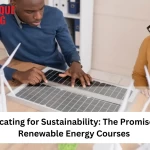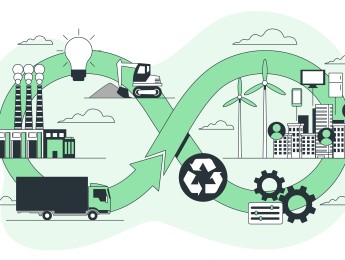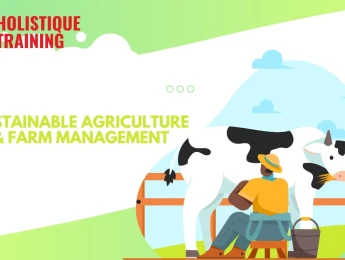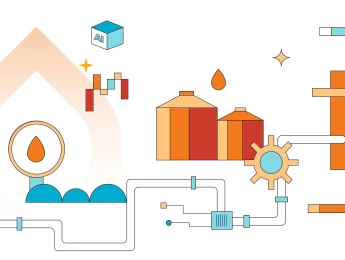The global energy landscape is undergoing a major transformation as countries, industries, and communities seek cleaner, more resilient, and sustainable energy systems. This course introduces participants to the core principles, technologies, and policy mechanisms that are driving the global shift toward renewable energy. It explores how replacing fossil fuels with solar, wind, hydro, and other clean sources is not only an environmental necessity but also an economic and social opportunity.
Designed for professionals, decision-makers, and change agents, the course examines the current challenges and practical strategies for accelerating the renewable energy transition. Through real-world case studies, policy reviews, and innovation insights, participants will gain the tools to design or support renewable energy solutions across multiple sectors and contexts.
By the end of this course, participants will be able to:
- Explain the need and urgency for transitioning to renewable energy.
- Understand the various types of renewable technologies and their applications.
- Assess the economic, social, and environmental impacts of renewables.
- Examine policies, financial incentives, and international energy frameworks.
- Identify strategies for integrating renewables into power grids and local systems.
- Apply knowledge to support clean energy initiatives in their regions or industries.
This course is ideal for:
- Energy professionals and engineers interested in clean energy solutions.
- Policymakers, regulators, and government staff in energy and environment sectors.
- Consultants and advisors working on energy or climate strategies.
- NGO leaders and activists focused on sustainability and climate action.
- Academics, researchers, and students in energy, policy, or environmental science.
- Utility providers, infrastructure developers, and urban planners.
The training combines expert-led presentations, policy simulations, case study analysis, and group discussions. Participants will engage with data sets, explore global trends, and apply tools to design transition strategies. The course emphasizes real-world applicability and encourages knowledge sharing between participants from different sectors and regions.
Day 5 of each course is reserved for a Q&A session, which may occur off-site. For 10-day courses, this also applies to day 10
Section 1: Foundations of Renewable Energy Transition
- Understanding global energy demand and supply trends.
- Climate change, energy security, and the case for transition.
- Defining renewable energy and distinguishing it from traditional sources.
- Benefits of renewable energy: environmental, social, and economic.
- Challenges and myths around renewable adoption.
- Review of international energy reports and projections.
Section 2: Renewable Energy Technologies and Applications
- Solar power: photovoltaic, solar thermal, and utility-scale systems.
- Wind energy: onshore vs. offshore systems and technological progress.
- Hydropower: large-scale dams, run-of-river, and pumped storage.
- Other renewables: geothermal, biomass, tidal, and wave energy.
- Comparing technologies: strengths, limitations, and ideal use cases.
- Trends in hybrid systems and renewable energy innovation.
Section 3: Socio-economic and Environmental Impact
- Job creation in the clean energy sector.
- Cost trends and investment opportunities in renewable energy markets.
- Environmental benefits: emissions reduction, air and water quality, biodiversity.
- Land use debates and community concerns.
- Energy access and social equity through distributed systems.
- Global case studies: national and community-level success stories.
Section 4: Policies, Incentives, and International Frameworks
- Government roles in enabling renewable transitions.
- Policy tools: feed-in tariffs, tax credits, net metering, and subsidies.
- Regulatory instruments: renewable standards, carbon pricing, permits.
- Global agreements: The Paris Agreement and the SDGs.
- Regional cooperation and energy trade.
- Private sector engagement and public-private partnerships.
Section 5: Integration, Storage, and Future Outlook
- Grid integration: balancing variable supply and demand.
- Energy storage technologies: batteries, thermal storage, and pumped hydro.
- Smart grids and digital energy management tools.
- Off-grid and decentralized solutions for rural or remote regions.
- Emerging trends: green hydrogen, EV infrastructure, and AI in energy.
- Planning for resilient and inclusive energy transitions.
Upon successful completion of this training course, delegates will be awarded a Holistique Training Certificate of Completion. For those who attend and complete the online training course, a Holistique Training e-Certificate will be provided.
Holistique Training Certificates are accredited by the British Accreditation Council (BAC) and The CPD Certification Service (CPD), and are certified under ISO 9001, ISO 21001, and ISO 29993 standards.
CPD credits for this course are granted by our Certificates and will be reflected on the Holistique Training Certificate of Completion. In accordance with the standards of The CPD Certification Service, one CPD credit is awarded per hour of course attendance. A maximum of 50 CPD credits can be claimed for any single course we currently offer.
- Course Code IND01-149
- Course Format Classroom, Online,
- Duration 5 days













